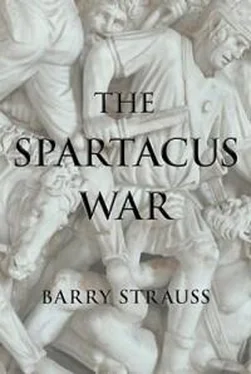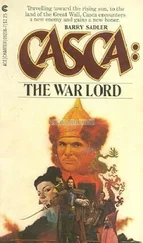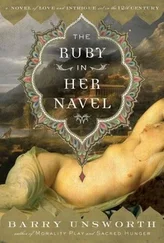Coarse and rapacious, Capua was destined to become the centre of gladiatorial games. Its sunny climate was considered ideal for training fighters and so Rome’s impresarios came to scout talent. Julius Caesar himself would own a gladiatorial school in Capua.
And yet, by 73 BC, not Capua but Rome - the capital - put on Italy’s greatest gladiatorial games by far. Rome’s cautious elite refused to allow gladiators to be housed there, though. Violent and dangerous, gladiators would have been foxes in the Roman henhouse. It was safer to keep them outside the capital. Capua was ideal: only 130 miles away, and connected to Rome by the most famous highway in the world, the Appian Way, as well as by another great road, the Via Latina.
After travelling one of those highways or perhaps, even before, in the chain gang along the way, Spartacus was introduced to his new colleagues. They were a motley group. Almost all were slaves, whether from birth, by civilian capture and sale, or as a result of becoming prisoners of war. Many were Thracians. Thrace provided Rome with a steady stream of slaves, thanks to the endless wars with Rome’s bordering province of Macedonia. And thanks too to the Thracians’ burning passion for war.
Thracians loved three things: hunting, drinking and fighting. They were born brawlers with a reputation for brutality. Thracian cavalrymen, for example, fought ‘like wild beasts, long kept in cages and then aroused’ [11] Livy, History of Rome 42.59.
when they defeated the Romans at a skirmish at Callinicus in 171 BC. They returned to camp singing and brandishing the severed heads of their enemies on their spears.
Another people in the Roman world who were similarly spoiling for a fight were the Celts. The Celts ‘are absolutely mad about war’ [12] Strabo, Geography 4.4.2. trans. Philip Freeman, War, Women, and Druids. Eyewitness Reports and Early Accounts of the Ancient Celts (Austin: University of Texas Press, 2002), 12-13.
, says the Roman writer Strabo. ‘They are high-spirited and quickly seek out a fight.’ And Celts made up the second large group of Vatia’s gladiators. The sources call them Gauls, and surely some of them came from Gaul, that is, modern France. They might have been taken prisoner in one of several small Roman military operations in Gaul in the 80s and 70s BC. They might even have been the sons of war prisoners taken in Marius’s great victories in the West in 102 and 101 BC. But most had probably been sold into slavery by civilians: the going rate for a Gallic slave [13] Diodorus Siculus 5.26.3-4.
was as little as an amphora (large jug) of wine. The Romans exported an estimated 40 million amphorae of wine [14] A. Tchernia, ‘Italian Wine in Gaul at the End of the Republic’, in Peter Garnsey, Keith Hopkins and C.R. Whitaker, eds., Trade in the Ancient Economy (Berkeley: University of California Press, 1983) 92, 97-8.
(about 2.64 million gallons) to Gaul in the first century BC and got back in return perhaps as many as 15,000 slaves a year.
But some of Vatia’s Celts may have came from the Balkans, a Celtic population centre and scene of wars with Rome in the 80s and 70s BC, and so a rich source of slaves. The Scordisci, for example, lived on the plains south of the Danube, in what today is north-eastern Serbia, and were Celts who had mingled with Thracians and Illyrians (another warlike people of the ancient Balkans).
If Vatia or his agents indeed had bought Scordisci, they had chosen the wrong Celts. Thracians and Scordisci shared a border and a hatred for Rome. In 88 BC the Scordisci and many Thracians supported Mithridates in his revolt against Rome [15] Cassius Dio frg. 101.
. A joint army of Thracians and Scordisci invaded the Roman province of Greece in a major raid; both peoples later suffered in Roman punitive expeditions.
We probably ought to add Germans to the mix of gladiators in the house of Vatia. Germans too played a prominent role as Spartacus’s soldiers. Many of Italy’s slaves were German or children of Germans who, like Celts, had been captured in large numbers by Marius thirty years earlier; others had been sold into slavery by civilians. Besides, there was no clear distinction between Celts and Germans in 73 BC: boundaries blurred. In any case, both Greco-Roman writers and archaeologists agree that the ancient peoples of today’s Germany were warlike, like Celts and Thracians. ‘Peace is displeasing to [their] nation,’ [16] Tacitus, Germania 14.
wrote the Roman historian Tacitus, who stated that the Germanic economy rested on war and plunder. We don’t hear of Germans until Spartacus’s revolt spread, but maybe a few of Vatia’s gladiators were German.
Perhaps other ethnic groups from around the empire contributed men to Vatia’s enterprise. Anatolia and the Black Sea region both provided Rome with many of its slaves, and Vatia’s establishment possibly included representatives of those lands. But one last important group to consider was not foreign at all: free Italians, even Roman citizens. Both poor and rich citizens volunteered as gladiators, whether out of desperation, boredom or a search for adventure. In the first century BC such forays into the Italian underworld had already become fashionable.
And so we have the 200 or more gladiators owned by Vatia: Thracians and Celts, with a likely admixture of Germans, Italians and odd-lot others. Spartacus’s colleagues were a multi-ethnic group. This was no accident. Roman authors advised mixing nationalities as a deterrent to solidarity. They recognized the deadly seriousness of a business that armed slaves.
Surprisingly, the Romans called a gladiatorial enterprise a game: in Latin, ludus. Ludus is often translated as ‘school’, and indeed it trained beginners but, with few exceptions, there were no graduates. Most gladiators lived and died in the ludus where they started out.
Romans also described a ludus as a familia, which means ‘family’ or ‘household’. As in any household, the ludus attended to the basic needs of food and shelter but it also offered medical care. Gladiators had to limit wine intake and eat a high carbohydrate diet, heavy on barley porridge. Like sumo wrestlers they were encouraged to put on fat around the middle, in their case as a protective layer in case of wounds. Like pampered racehorses, gladiators ate well. ‘Tell your masters to feed their slaves!’ [17] Dio Cassius 77.10.2.
was the acerbic advice of a bandit in the Roman Empire as to how the Romans could stop crime. He would have been preaching to the choir had he addressed lanistae since they had to treat their gladiators well in order to succeed.
But a ludus was also a barracks and a prison. Gladiators were not free to come and go as they pleased. The best evidence comes from Pompeii, where two ludi from different periods have been excavated. Both stood at the edge of town. The earlier ludus was virtually a fortress, isolated by a raised, sloping pavement and additional steps, bringing the interior a full 10 feet above street level - all unusual for Pompeii. Other security measures were found inside: an extra door and a sealed courtyard. Pompeii’s second, later ludus was more open but it did contain a small jail, complete with iron stocks, and it may have held a guard post as well.
Vatia’s ludus too would probably have been built around an internal court, surrounded by stuccoed columns that were, in turn, covered with graffiti, such as these from Pompeii [18] all these examples come from the earlier ludus in Pompeii and appear in Luciana Jacobelli, Gladiators at Pompeii (Los Angeles: John Paul Getty Museum, 2004), 48-9, 65-6.
: Celadus advertised himself as ‘the one the girls sigh over’. Florus reports that he won on 28 July at Nuceria and on 15 August at Herculaneum, both nearby cities. Jesus (sic) says, punning, that the murmillo Lucius Asicius stinks like cheap fish sauce (muriola) and is as weak as a lady’s drink (also called muriola). Some gladiators record the name of their owner, while the gladiator Samus, who fought both as a murmillo and on horseback, says simply that he ‘lives here’. The gladiators Asicius, Auriolus, Herachthinus, Philippus and the ‘fearsome’ Amarantus scratched their names and positions into the white stucco.
Читать дальше












